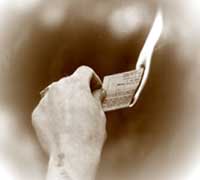The oral argument then went to Allan A. Herrick representing the Des Moines, Iowa Independent Community School District. He argued that there were two issues that needed to be handled, which the schools did, and was when the school could prevent disruptions in the school due to free speech and just how far the Court was willing to extend the students’ rights. He said that basically the schools were acting in good faith in trying to prevent a disruption and that the Court had already stated in previous cases that the free speech was not absolute depending on the time and place of the speech. He then quoted Adderly v. State of Florida, in which seven hundred students had protested the arrest of students by walking from the university to the prison. However, the justices brought up the disparity between the size of the two groups and wondered how the seven students could disrupt 18,000 like the 700 in Florida could.
Herrick also argued that there indeed had been an incident due to the armband worn by John Tinker, in which one or two boys had been hit in a fight. Additionally, the school board was just reacting to a series of events that had occurred in relation to the Vietnam War before the armband policy had been implemented. There had been a march and two draft card burning incidents that had caused the already highly charged issue to become even more so in the area. When they heard about the Tinkers’ plans, they were just trying to prevent the students from getting into heated arguments that could turn violent and disruptive over the differences in opinion about the Vietnam War. The justices then countered by saying if this logic was applied, then the taking away of First Amendment rights in any community that was experiencing political unease would be perfectly legal.
Herrick then returned to the issue mentioned previously about when the students’ First Amendment rights could be abridged. He said that those rights are not absolute and that if it is in the public interest and good to prevent the disturbance from the speech, then it should be done. He also said the school system was obligated to create a disciplined, academic environment in which students could learn effectively in the classroom. He also argued that the school systems and the states have the right to run their schools and make its policy with limited interference from the federal government due to reserved powers.

No comments:
Post a Comment